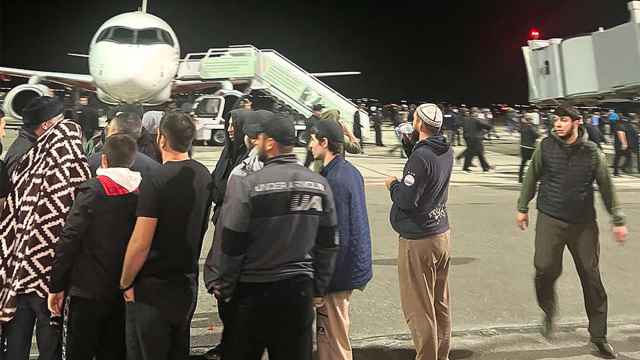Metal rods, hammers, stun guns, brass knuckles, baseball bats, knives and air guns were confiscated from 1,700 people detained nationwide, confirming that the threat of ethnic clashes was real, a senior Interior Ministry official said Thursday.
Police prevented ethnic clashes on Wednesday in six cities — Moscow, St. Petersburg, Tolyatti, Nizhny Novgorod, Rostov-on-Don and Novosibirsk — as well as the Belgorod and Samara regions and the Udmurtia republic, First Deputy Interior Minister Mikhail Sukhodolsky said, the ministry's web site reported.
Krasnodar police also prevented an attempted riot, a local police source told Interfax.
About 6,000 police officers and 1,000 Interior Ministry troops were deployed Wednesday on the streets of Moscow, the main hotbed of unrest, Sukhodolsky said.
But clashes in the capital were not completely avoided, with 12 people hospitalized with injuries received in street fights, a source in the ambulance service told RIA-Novosti on Thursday, without elaborating.
Only two cases were reported to have been opened, both against Caucasus and Central Asian natives for attacking ethnic Russians.
One brawl saw some 20 Caucasus natives attack three ethnic Russians outside the Yugo-Zapadnaya metro station Wednesday, Sukhodolsky said. Three police officers will be awarded medals of valor for bruises they sustained when intervening in the fight, he said.
The three policemen detained 12 participants, including natives of Kabardino-Balkaria, Dagestan, Chechnya as well as the countries of Georgia, Armenia and Tajikistan, all aged between 19 and 37, he said.
Another case was opened over a fight outside the Park Kultury metro station, where three Dagestani natives severely beat a young ethnic Russian and shot him with an air gun, the Investigative Committee said in a statement.
The three Dagestanis, also not identified, were detained and face charges of attempted murder, which carries a life sentence.
New reports of violence surfaced Thursday, with Interfax saying a group of young men marched in the Moscow region town of Solnechnogorsk, chanting nationalist slogans and beating up dark-skinned passers-by.
Also, 18 young people, including Russian and Caucasus natives, were detained in the nearby Moscow suburb of Zelenograd for aggressive behavior, local police chief Alexander Zvonaryov told Interfax.
Meanwhile, President Dmitry Medvedev praised Moscow's police on his Twitter blog early Thursday. “Moscow police acted professionally yesterday. They need to rest. You rest, too. Good night!" he wrote shortly after midnight.
Later Thursday, Medvedev said rioting is a serious crime that must be punished with real prison terms, not treated as minor offenses, Gazeta.ru reported.
Twenty-two criminal cases have been opened into participants of an unsanctioned nationalist rally on Manezh Square that turned violent Saturday, the Prosecutor General's Office, which took the cases under its control, said in a statement Thursday. The suspects face lengthy terms on charges of rioting and inciting ethnic hatred.
A suspected organizer of the Manezh Square riot was also detained, Interior Minister Rashid Nurgaliyev said. The suspect, Ilya Kubrakov, called participants of the Saturday rally to violence through a megaphone and is suspected of killing a Kyrgyz citizen the next day, the minister said.
North Caucasus republics reacted to the unrest as well, with Kabardino-Balkaria's parliament asking the Moscow City Duma to "work out a raft of measures" in cooperation with law enforcement agencies "to prevent a further rise of nationalist activity" in Moscow, Interfax reported.
Ravil Gainutdin, chairman of the Muftis' Council of Russia, said Russians needed migrants to work for them because Russians "don't like to work" but like to "watch porn, drink alcohol, take drugs and hang out in clubs," Interfax reported.
Nationalists will "destroy" Russia if they succeed in forcing migrants out of the country, he said.
The unrest is partly to blame on the “total criminalization” of the country between the 1980s and the early 2000s, a time marked by an "outbreak of domestic violence, impudence and disrespect of the rights of the others," Justice Minister Alexander Konovalov said.
"Inappropriate conditions" in the nation's prisons that "turn people into wolves or dogs that don't respect the state and the law" also probably contributed to the problem, Konovalov told a news conference.
But opposition politician Boris Nemtsov blamed the unrest on a "total failure of youth policy" by authorities and personally on the Kremlin's first deputy chief of staff, Vladislav Surkov, who oversees it.
Nemtsov's remarks, on his blog, were in response to accusations by Chechen President Ramzan Kadyrov that the liberal opposition was to blame.
Staff writer Alexander Bratersky contributed to this report.
A Message from The Moscow Times:
Dear readers,
We are facing unprecedented challenges. Russia's Prosecutor General's Office has designated The Moscow Times as an "undesirable" organization, criminalizing our work and putting our staff at risk of prosecution. This follows our earlier unjust labeling as a "foreign agent."
These actions are direct attempts to silence independent journalism in Russia. The authorities claim our work "discredits the decisions of the Russian leadership." We see things differently: we strive to provide accurate, unbiased reporting on Russia.
We, the journalists of The Moscow Times, refuse to be silenced. But to continue our work, we need your help.
Your support, no matter how small, makes a world of difference. If you can, please support us monthly starting from just $2. It's quick to set up, and every contribution makes a significant impact.
By supporting The Moscow Times, you're defending open, independent journalism in the face of repression. Thank you for standing with us.
Remind me later.





